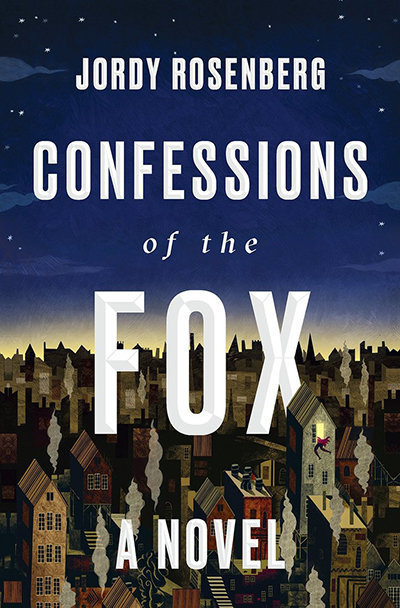[ad_1]
The star of Jordy Rosenberg’s debut novel, Confessions of the Fox, might be familiar to you already. Jack Sheppard, a legendary 18th century pickpocket and jailbreaker, operated for only about a year before being hanged for his crimes. But in that short span, his madcap spate of robberies and subsequent daring escapes from prison enthralled the working-class population of London. An immediate folk hero, he was immortalized in theatrical works by John Gay and, later, Bertolt Brecht.
Rosenberg, who teaches 18th century literature and queer/trans theory at the University of Massachusetts Amherst, felt the same inexorable draw to fictionalize Sheppard’s life as have many artists. “It’s actually not a unique thought that there’s a novel of his life,” he told me as we sat in his Manhattan apartment overlooking the city.
But drawing from his study of London in the 18th century, and from personal experience, Rosenberg knew that he wanted to do something different with the fascinating figure. Or, rather, lots of different things. Confessions is a historical novel, but it’s also speculative fiction, metafiction and a political argument.
And the figure at its heart, Jack Sheppard, is, in Rosenberg’s fictional world, a trans man.
Rosenberg, who is trans himself, recalled that most publishers were far more eager to publish a possible memoir about his experience as a trans man than a speculative historical novel featuring a trans character.
“The thirst for my book to be a memoir rather than fiction was very powerful and palpable,” he said. But he was uncomfortable with the demand for memoir ― specifically, from the perspective of a white trans man ― which he sees as not only potentially soliciting self-objectification (a new iteration of the proto-scientific case study genre that often treated non-gender-conforming people as specimens), but in his case, as centering white voices as authorities on the subject. He ultimately published the book through One World, a Random House imprint focused on marginalized authors and genre-bending works.
“There are ways in which, for trans people, for genderqueer people, and for many oppressed people, our existence is treated as an unreality, and that’s something that we fight against,” he explained. “The language and literature is one way. It’s not the only or even the primary way. But we also have to fight for the ability to write fiction and to write stories that are themselves speculative and unreal…. We can resist this self-objectifying case study model.”
Art, he’s deeply aware, can easily reiterate and enshrine political oppression ― the novel being no more exempt from doing so than memoir. In writing Confessions of the Fox, he hoped to unite art with other imperatives: historical illumination, political advocacy and, of course, unabashed fun. “It was a balancing act,” he told me. “I really wanted to make a book that was entertaining, but then I also was trying to balance it with a lot of historical and political commitments.”
He wanted to write a “sexy, political” novel about Sheppard. And it is both very sexy and very political, though not exactly equivalent to a placard waved at a street demonstration. It’s a rollicking yarn with a thread of tender first love, a page-turning tale of 18th century devilry. It’s a book that’s just as interested in its political messages as it is in its craft and narrative, and, unlike most books of this ilk, it’s compelling on each level.

One World
The novel takes the form of a found manuscript, the apparently genuine memoirs of Sheppard himself. It follows a young Sheppard, raised a girl, as he escapes from an apprenticeship to an abusive carpenter and remakes himself as a man of the streets. He meets Bess, a sex worker who becomes his lover and partner in crime, and he pulls off heists and carouses with a motley assortment of low-level criminals. He has a preternatural ability to wriggle out of tight spots ― his escapes in the novel, like his infamous breakout of Newgate Prison, were drawn closely from historical documents of the real Sheppard.
Rosenberg sees Sheppard’s crimes, in themselves, as a political statement. The escape artist has been a populist hero since the beginning, a figure of defiance in the face of state violence and policing of the poor and marginalized. “Sheppard was repeatedly jailed for minor property crimes that, at the time, carried a capital punishment,” Rosenberg said. Through his daring escapes and incorrigible crime spree, “he became a very important emblem of resistance to forms of consumer capitalism, to the birth of the police state.”
The London of Confessions of the Fox is not the London many readers will recognize from popular historical fiction. “One of the problems with a lot of historical fiction about London in the 18th century is that it’s imagined by white authors to be a uniformly white city, and we know this just isn’t true,” he told me. “I wanted it to be historically true to the intersection of forces that we know were real and are real.” This involved reimagining certain characters as people of color: Bess becomes Bess Khan, the daughter of a white Englishwoman and a Southeast Asian sailor.
Rosenberg was wary of the straightforward strategy of simply making the characters diverse. “My feeling was that the question of representation could not be left to the level of content alone,” he told me, “but that this question of a white author representing characters of color, which I find to be a very contradictory and complicated and, I’m sure ultimately on many levels, necessarily failed project of mine, that it was going to have to influence the form of the novel as well.”
He introduced layers of self-critique: Rosenberg frames Sheppard’s narrative as a found first-person text being annotated by a renegade trans scholar, Dr. Voth, who believes the work to be Sheppard’s own memoirs ― a theory that is repeatedly complicated over the course of the novel. In footnotes, Dr. Voth provides historical background and critical references but also shares his dating woes and clashes with the university administration. Rosenberg calls Voth “both the most memoiristic and the most character-driven” figure in the novel; by presenting a fictionalized, flawed version of himself, he builds in an awareness of his own privileges and shortcomings as an author, and ours as readers. The book continually teaches us to question our own comfortable notions of the Western canon, European history and the role of literature.
And yet Rosenberg isn’t entirely satisfied. “You can issue self-critique, and there is self-critique issued in it, but it still doesn’t resolve the historical contradictions of capitalism and racism. If you could, someone would just write a book that says, like, ‘Capitalism is over.’ And that would be the one sentence, and that’d be the end of the book.”
You can issue self-critique, and there is self-critique issued in it, but it still doesn’t resolve the historical contradictions of capitalism and racism. If you could, someone would just write a book that says, like, “Capitalism is over.” And that would be the one sentence, and that’d be the end of the book.
Jordy Rosenberg
Some of the impasses he found himself at seemed irresoluble. How could he write about the full range of a trans man’s experience, including sex (again, it is a very sexy novel), without “soliciting a prurient gaze” toward Jack and, for that matter, Bess? In attempts to avoid voyeuristic lingering over their bodies, he found himself writing terrible sex scenes entirely represented through metaphors, like a storm cloud sweeping through. Something had to give. In the end, he avoided explicit descriptions of their bodies but found gentle ways to sketch out the act of sex.
The inability to fully resolve these problems, Rosenberg said, “would sometimes cause me to want to be faithful to certain aesthetic questions.” Instead of consistently grappling with the horrors of capitalism, cisnormativity and racism, “Sometimes I would just come up with this feeling that the best that I could do was to try to make something that would keep a reader company at night.”
Confessions of the Fox could feel conflicted, even Frankensteined, by all of the author’s competing priorities. Instead, it’s seamlessly integrated into something more than the sum of its parts. The historical and political critiques infuse the musty period prose with fresh urgency and unconventional narrative twists. Rosenberg’s suspicion of the novel’s roots in a capitalistic, racist culture has somehow propelled him into writing a particularly brilliant one.
Since the election of Donald Trump, many in the literary community have been at pains to argue for the continued relevance of their craft ― that now, more than ever, literature and art serve a vital purpose in promoting human rights, free speech and progressive ideals. Despite the heavy dose of politics in Confessions of the Fox, Rosenberg isn’t entirely convinced. Art, he argues throughout our conversation, is neither separate from politics nor sufficient to changing it.
Last year, as Trump’s hastily implemented travel ban targeting several Muslim-majority countries was met with massive airport protests and street demonstrations, Rosenberg watched the ghastly scene unfold from his hospital bed.
It was the last place he wanted to be at that historical moment. Rosenberg had recently had a hysterectomy ― “partially for gender-confirming reasons and partially not” ― and had suffered complications. In any situation, the ensuing ordeal would have been miserable: He was restricted to his bed for at least a month and dealt with complications even longer. Rosenberg was in the final stages of revising the novel. His illness gummed up the publication schedule.
And taking part in a protest march? Infuriatingly, that was out of the question.
“At that moment, I thought, ‘Fuck. I don’t want to write any more books,’” Rosenberg told me. “‘I don’t want to do anything that means I have to be inside anymore, tied to a computer. All I want, all I want is to be outside with people resisting this.’”
Rosenberg harbored an ambivalent stance toward writing fiction before that. Though Confessions of the Fox is his debut, he said, he’s been “writing novels and throwing them away since my late 20s ― so, for about 17 years.” He wasn’t throwing them in the garbage for lack of commercial interest; several of the binned works had literary agents. Yet often, he said, “by the time I was at the end of it, I would disagree with the premise of the novel.” Unwilling to stand behind the book, he’d “denounce it” and move on to a new project instead.
But he never soured on Confessions of the Fox, though he’s been working on it, on and off, since 2009. Perhaps, Rosenberg speculated, because he’s “just become entrenched in my current political positions” ― the threads of anti-capitalism and anti-racism that run through the work still matter to him profoundly. And, despite his crises of confidence, he believes fiction, however flawed and insufficient, has its place.
“Writing and activism are not the same thing, but there’s a relationship between them that I’m continually interested in.” Being hospitalized during the spasm of anti-Muslim-ban protests didn’t finally kill his interest in writing, but it did change it. “It just made me keep thinking about how to make writing come out of being in the world, and being in struggle.”
CLARIFICATION: This article has been updated to reflect a change in a character’s name that was instituted after review copies were sent to critics. Bess Dev is now Bess Khan.
[ad_2]
Source link

